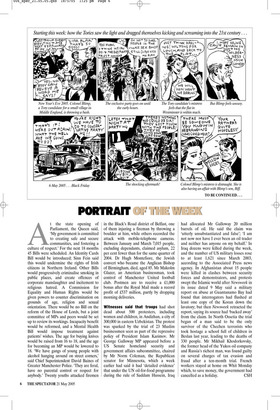PORTRAIT OF THE WEEK A t the state opening of Parliament,
the Queen said, ‘My government is committed to creating safe and secure communities, and fostering a culture of respect.’ For the next 18 months 45 Bills were scheduled. An Identity Cards Bill would be introduced; Sinn Fein said this would undermine the rights of Irish citizens in Northern Ireland. Other Bills would progressively criminalise smoking in public places, and create offences of corporate manslaughter and incitement to religious hatred. A Commission for Equality and Human Rights would be given powers to counter discrimination on grounds of age, religion and sexual orientation. There would be no Bill on the reform of the House of Lords, but a joint committee of MPs and peers would be set up to review its workings. Incapacity benefit would be reformed, and a Mental Health Bill would impose treatment against patients’ wishes. The age for buying knives would be raised from 16 to 18, and the age for becoming an MP would be lowered to 18. ‘We have gangs of young people with alcohol hanging around on street corners,’ said Chief Superintendent David Baines of Greater Manchester Police. ‘They are feral, have no parental control or respect for anybody.’ Twenty youths attacked firemen in the Black’s Road district of Belfast, one of them injuring a fireman by throwing a boulder at him, while others recorded the attack with mobile-telephone cameras. Between January and March 7,015 people, excluding dependants, claimed asylum, 22 per cent fewer than for the same quarter of 2004. Dr Hugh Montefiore, the Jewish convert who became the Anglican Bishop of Birmingham, died, aged 85. Mr Malcolm Glazer, an American businessman, took control of Manchester United football club. Postmen are to receive a £1,000 bonus after the Royal Mail made a record profit of £537 million, partly by dropping morning deliveries.
Witnesses said that troops had shot dead about 500 protesters, including women and children, in Andizhan, a city of 300,000 in eastern Uzbekistan. The protest was sparked by the trial of 23 Muslim businessmen seen as part of the repressive policy of President Islam Karimov. Mr George Galloway MP appeared before a US Senate homeland security and government affairs subcommittee, chaired by Mr Norm Coleman, the Republican senator for Minnesota, which a week earlier had said it had ‘detailed evidence’ that under the UN oil-for-food programme during the rule of Saddam Hussein, Iraq had allocated Mr Galloway 20 million barrels of oil. He said the claim was ‘utterly unsubstantiated and false’; ‘I am not now nor have I ever been an oil trader and neither has anyone on my behalf.’ In Iraq dozens were killed during the week, and the number of US military losses rose to at least 1,621 since March 2003, according to the Associated Press news agency. In Afghanistan about 15 people were killed in clashes between security forces and demonstrators, and protests swept the Islamic world after Newsweek in its issue dated 9 May said a military report on abuse at Guantanamo Bay had found that interrogators had flushed at least one copy of the Koran down the lavatory; but then Newsweek retracted the report, saying its source had ‘backed away’ from the claim. In North Ossetia the trial began of a man said to be the only survivor of the Chechen terrorists who took hostage a school full of children in Beslan last year, leading to the deaths of 330 people. Mr Mikhail Khodorkovsky, the former head of the Yukos oil company and Russia’s richest man, was found guilty on several charges of tax evasion and fraud after a ten-month trial. French workers stayed at home on Whit Monday which, to save money, the government had cancelled as a holiday. CSH

























































 Previous page
Previous page